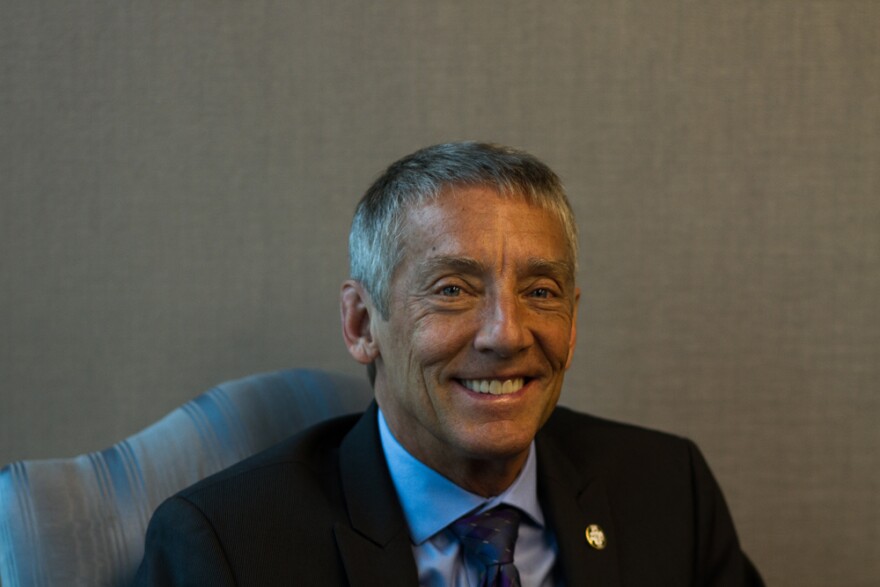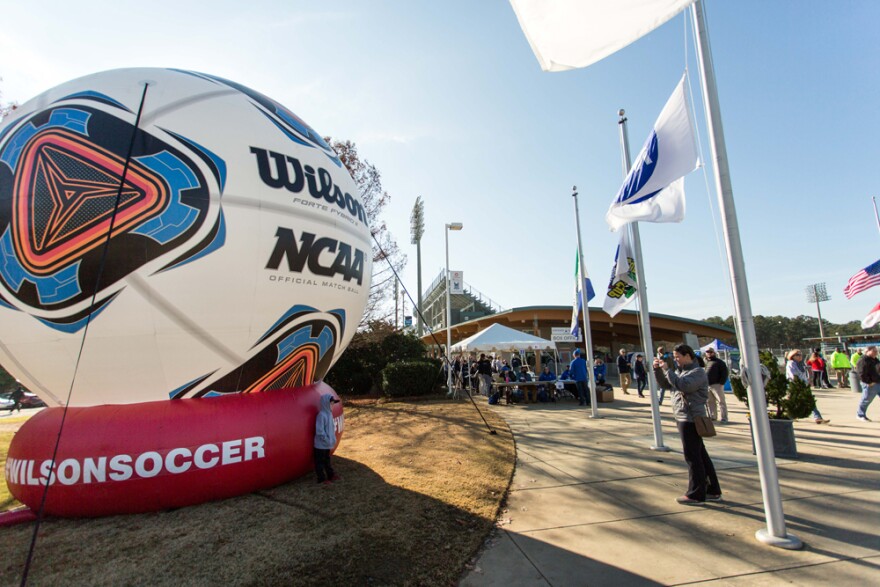Legislators have spent much of the past year - even the last few weeks - posturing on House Bill 2's pros and cons, without any action. But perhaps the most tangible impact of the law has been on the business front.
It's quiet at WakeMed Soccer Park in Cary on a recent afternoon. A giant green tarp covers the entire field. The sun's rays reflect off the metal bleachers and hit you in the eye. A chain linked fence door clangs in the wind. The usually vibrant athletic park hasn’t been as vibrant lately. To blame are college sports leagues that pulled out of North Carolina following the passage of House Bill 2.
A State Divided: HB2 & Transgender Rights - A Special Report
Because of the law, the National Collegiate Athletic Association and the Atlantic Coast Conference pulled nearly two dozen championships from North Carolina last year.
The leagues pulled lucrative events from Cary, Durham, Raleigh and several other cities. Just like that, college sports pulled out of a state that loves college sports. Adores them even.

"College sports is really part of the fabric of the state, and that's really what sort of makes it more personal for so many people here," said Scott Dupree, who directs the Greater Raleigh Sports Alliance.
Dupree's group works with government officials around the state to attract sporting events here.
When these teams come to town, so do fans and families. That means heads on hotel room pillows, and meals at local restaurants.
The economic hit on Cary has been significant, but its not the only victim of HB2. Private companies have abandoned expansion and hiring plans. Rock stars have canceled shows. Even the NBA relocated its All-Star game.
College sports is really part of the fabric of the state, and that's really what sort of makes it more personal for so many people here. - Scott Dupree, director of the Greater Raleigh Sports Alliance
The fiscal damage is estimated to be in the hundreds of millions of dollars.
Cary's Mayor Harold Weinbrecht became an outspoken opponent of HB2. He said he simply couldn’t stay quiet anymore after the fallout of the law hurt his town so badly. He saw the impact all over.
"I remember going out to eat one night and there was an entire soccer team that was playing in the final four in there," Weinbrecht said. "And it took half the restaurant. I mean that’s huge for that restaurant for that night."

It wasn't just sporting events that pulled out of North Carolina. Companies around the nation criticized the bill and vowed never to consider expanding within the state. The business atmosphere was tense following the bill's passage. Was it just big talk?
And then the dominoes started to fall after PayPal announced it would no longer open a global operations center in Charlotte. The NFL, NBA, Coca-Cola and Apple joined the list of others, calling for a veto of the bill. Even the federal government threatened to pull funding from North Carolina.
We want the message to get out there that we are still progressive, that we still do a lot of amazing things in the state of North Carolina. - Cary Mayor Harold Weinbrecht
By some estimates, the economic fallout from HB2 will ultimately top $5 billion. This alone won’t cripple the state's economy. After all, North Carolina has an annual GDP approaching $500 billion dollars. However, it will have an outsized impact on hotels, restaurants and other attractions. The tourism industry in North Carolina alone is about $17 billion annually. Even if spread over several years, a five-billion-dollar hit is a big deal.
Further economic loss still scares many in the area. In mid-April, the NCAA will run through a bid cycle and plan out all events through the year 2022. North Carolina could be left out completely.
Cary Mayor Weinbrecht holds hope that state lawmakers will come around. He says the impacts aren’t felt just in Cary or Charlotte, but around the state.

"Especially if the message gets out that you are not a welcoming state, then you are driving yourself toward the bottom in the U.S. and that's what we don’t want to be," he said. "We want the message to get out there that we are still progressive, that we still do a lot of amazing things in the state of North Carolina."
But the NCAA has been clear: Do something about HB2 or don’t expect our business.
If left out of an NCAA bid cycle, Tar Heel cities would feel the impact for years. More than 100 bids were submitted for these championship events for the next five years.
Scott Dupree said that’s in part because these events perform well here. And the NCAA has already given North Carolina time to repeal HB2.
"When they announced in September, they were pulling the events from North Carolina, at the same time they said, 'And we're also going to push the bid window, bid review process back to give North Carolina more time to get HB2 resolved'," Dupree said.
But resolving House Bill 2 seems unlikely. An attempt to repeal the bill failed during a special session in December. Lawmakers are now considering another repeal bill. But it might not come in time to keep the sporting event in the state. And if they go, North Carolina will continue to feel the economic effects of HB2 for years to come.







